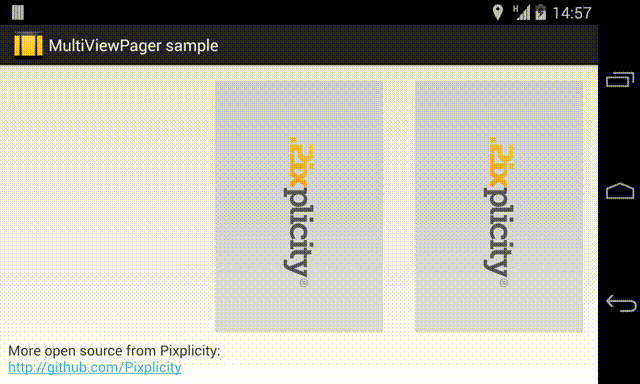MultiViewPager alternatives and similar packages
Based on the "ViewPager Widget" category.
Alternatively, view MultiViewPager alternatives based on common mentions on social networks and blogs.
-
Android-ViewPagerIndicator
DISCONTINUED. Paging indicator widgets compatible with the ViewPager from the Android Support Library and ActionBarSherlock. Originally based on Patrik Åkerfeldt's ViewFlow. -
SCViewPager
A simple keyframe-based animation framework for UIKit. Perfect for scrolling app intros. -
WoWoViewPager
Combine ViewPager and Animations to provide a simple way to create applications' guide pages. -
parallaxviewpager
DISCONTINUED. [Development stopped in 2014. Unfinished and not stable - not recommended to use.] An easy-to-use ViewPager subclass with parallax background effect for Android apps. -
NumericPageIndicator
Android - A ViewPager page indicator that displays the current page number and (optionally) the page count -
ViewPagerExtensions
DISCONTINUED. A set of custom views for the ViewPager from the Android Support Package -
Android-ScreenSlidePager
DISCONTINUED. Pager (especially for ViewPager) indicator in two styles: circle & fraction. -
LastPagerAdapter
Don't write a ViewPager Adapter! Hook up your ViewPager to your data model using Android Data Binding Framework. With Kotlin support!
WorkOS - The modern identity platform for B2B SaaS

* Code Quality Rankings and insights are calculated and provided by Lumnify.
They vary from L1 to L5 with "L5" being the highest.
Do you think we are missing an alternative of MultiViewPager or a related project?
README
MultiViewPager
UPDATE: This behavior is now included in the RecyclerView for support lib 24.2.0 and later. Please look at using LinearSnapHelper.
The MultiViewPager is an extension of the support-v4 library's ViewPager that allows the pages to be wider or narrower than the ViewPager itself. It takes care of aligning the pages next to each other, and always keeping the selected page centered.

Sample
Simply add the MultiViewPager into your layout:
<com.pixplicity.multiviewpager.MultiViewPager
android:id="@+id/pager"
android:layout_width="match_parent"
android:layout_height="match_parent"
app:matchChildWidth="@+id/child_view_to_match" />
Be sure to declare the app namespace:
xmlns:app="http://schemas.android.com/apk/res-auto"
Take note of the custom attribute matchChildWidth. This attribute should match an ID in the ViewPager's first child view. In the sample project, the layout of the pages is:
<RelativeLayout xmlns:android="http://schemas.android.com/apk/res/android"
xmlns:app="http://schemas.android.com/apk/res-auto"
xmlns:tools="http://schemas.android.com/tools"
android:layout_width="match_parent"
android:layout_height="match_parent"
tools:context="${relativePackage}.${activityClass}" >
<FrameLayout
android:id="@+id/vg_cover"
android:layout_width="200dp"
android:layout_height="match_parent"
android:layout_centerInParent="true" >
<ImageView
android:layout_width="match_parent"
android:layout_height="match_parent"
android:padding="16dp"
android:background="@drawable/bg_page"
android:scaleType="centerInside"
android:src="@drawable/im_pixplicity"
tools:ignore="ContentDescription" />
</FrameLayout>
</RelativeLayout>
The child view with ID @id/vg_cover will determine the width of the page. In this example, the width would be 200dp. In order to get this hooked up, we provide MultiViewPager with the reference to the child, @id/vg_cover:
<com.pixplicity.multiviewpager.MultiViewPager
android:id="@+id/pager"
android:layout_width="match_parent"
android:layout_height="match_parent"
app:matchChildWidth="@+id/vg_cover" />
In this way, it knows to size the pages according to the dimension of that View or ViewGroup.
Download
Download the latest AAR or grab via Maven:
<dependency>
<groupId>com.pixplicity.multiviewpager</groupId>
<artifactId>library</artifactId>
<version>1.0</version>
<type>aar</type>
</dependency>
or Gradle:
compile 'com.pixplicity.multiviewpager:library:1.0'
License
Licensed under the Apache license.
*Note that all licence references and agreements mentioned in the MultiViewPager README section above
are relevant to that project's source code only.


